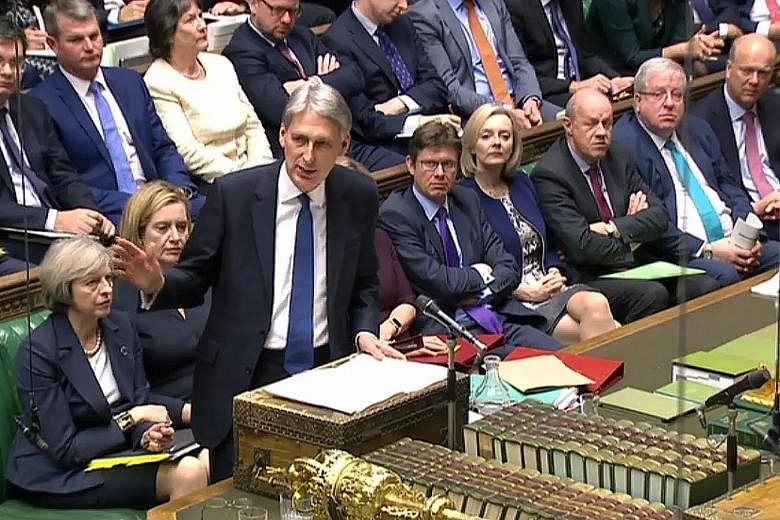LONDON • Britain's economic growth will slow sharply next year, Chancellor of the Exchequer Philip Hammond told Parliament yesterday in the government's first Budget statement since the nation voted to exit the European Union.
The shock June 23 referendum result will "change the course of Britain's history", he said in his first Autumn Statement yesterday.
As part of his statement, which included a slew of changes to business and personal taxes, he announced that Britain would lower its corporate tax rate to 17 per cent, making it the lowest among the world's top 20 economies and on a par with Singapore's tax rate.
The new, business-friendly rate comes ahead of US President-elect Donald Trump's promise to slash his country's corporate tax rate from 35 per cent - among the highest in the world - to 15 per cent.
By comparison, Britain's neighbour, Ireland, has a favourable 12.5 per cent tax rate while Singapore's close competitor, Hong Kong, has a tax rate of 16.5 per cent.
The new corporate tax rate is one of several measures to prop up the British economy post-Brexit, which Mr Hammond said has given urgency "to tackle our economy's long-term weaknesses".
Gross domestic product is expected to grow by only 1.4 per cent next year - sharply down from the prior estimate of 2.2 per cent given in March.
"That is slower, of course, than we would wish but still equivalent to the IMF's (International Monetary Fund) forecast for Germany, and higher than the forecast for growth in many of our European neighbours, including France and Italy," Mr Hammond said.
He noted, however, that Britain's economy was predicted to have expanded by 2.1 per cent this year, up from the government's previous estimate of 2 per cent.
In a keenly awaited Budget, he unveiled a package of United Kingdom-wide investment projects, including the building of homes and road improvements. He also raised the country's minimum wage level and hiked tax thresholds to give workers more take-home pay.
While the move is viewed as a government attempt to trim years of austerity triggered by the 2008 global financial crisis, Mr Hammond confirmed that he had abandoned predecessor George Osborne's target of a Budget surplus by 2019/2020.
"In view of the uncertainty facing the economy and, in the face of slower growth forecasts, we no longer seek to deliver a surplus in 2019-20," he said.
The British economy has remained resilient since the referendum, even as a cut in the Bank of England's main interest rate to a record low of 0.25 per cent has contributed to a slump in the pound.
Mr Hammond said the projected growth slowdown was due to "lower investment and weaker consumer demand, driven... by greater uncertainty and by higher inflation resulting from sterling depreciation".
Some experts have warned that a heavy blow could fall on Britain's economy once divorce proceedings with the rest of Europe begin.
AGENCE FRANCE-PRESSE
SEE WORLD

